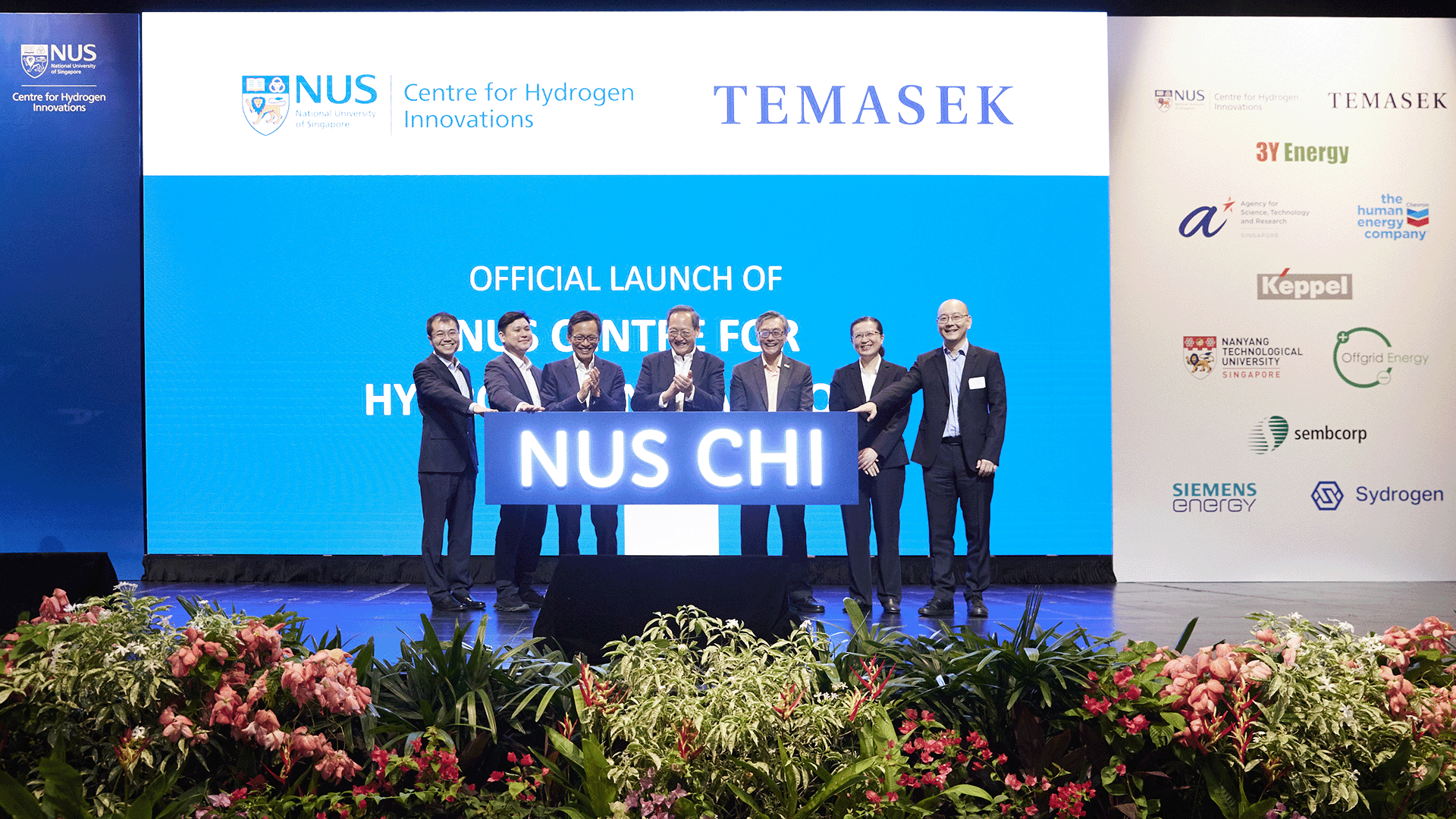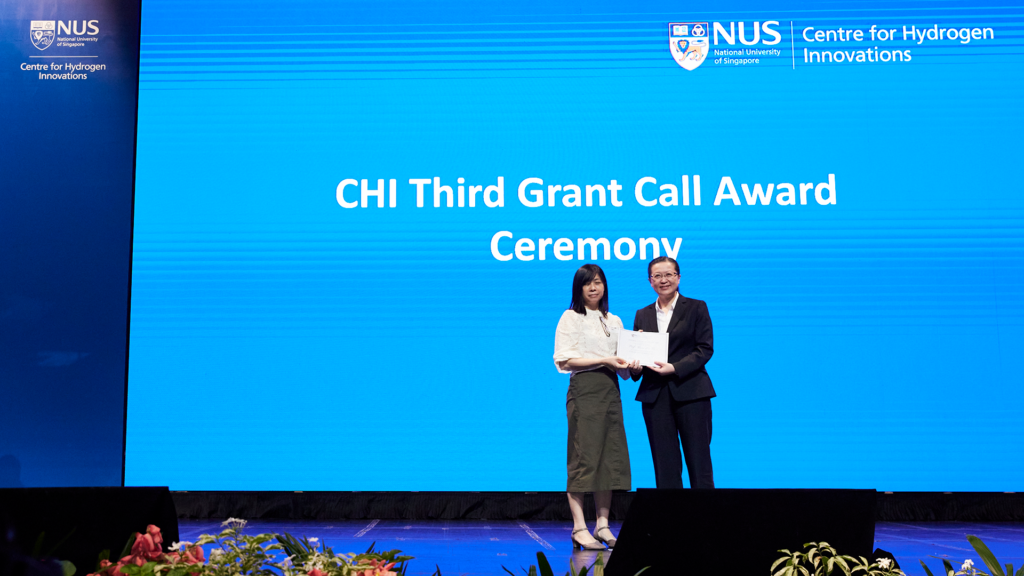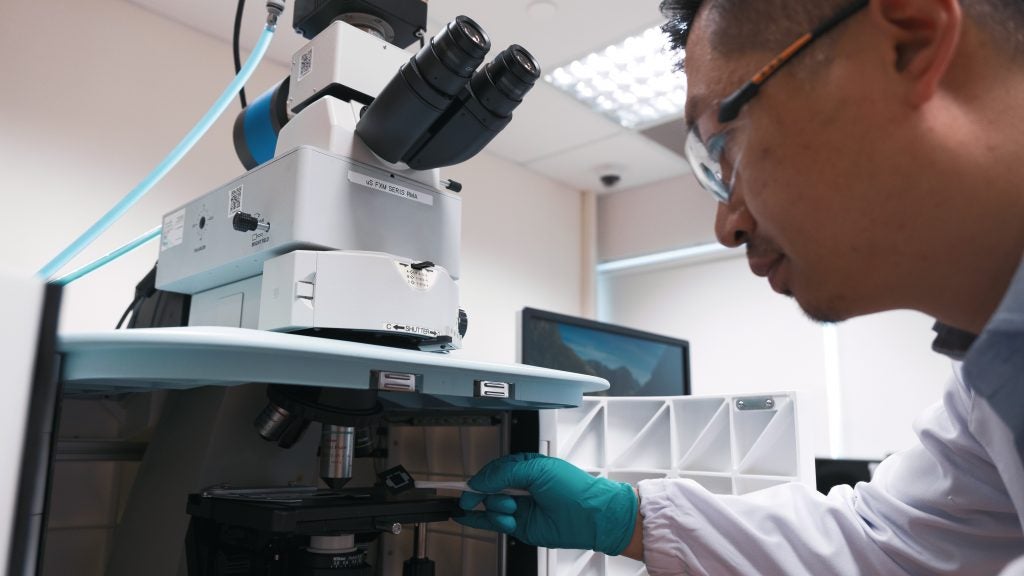
NUS has officially launched the Centre for Hydrogen Innovations (CHI), a university-level research centre focused on hydrogen-based sustainable energy solutions. The Centre is led by Professor Yan Ning (Chemical and Biomolecular Engineering) as CHI Director and includes 18 other faculty members from CDE among the Centre’s Principal Investigators.
The launch ceremony held on 25 July at the University Cultural Centre was officiated by Dr Tan See Leng, Minister for Manpower and Second Minister for Trade and Industry, and attended by distinguished guests from Singapore's hydrogen research and industry sectors.
Speaking at the ceremony, NUS President Professor Tan Eng Chye said that hydrogen, having the highest energy per mass of any fuel, had much potential to be a game-changer in decarbonising the world economy and combatting climate change. As such, he said, the launch of CHI “represents a bold, significant step that NUS is taking towards building a sustainable future.”
Prof Tan added: “The Centre is taking off on a strong start, and I look forward to its contributions towards knowledge building, Singapore’s climate target of net zero emissions target by 2050, and the global fight against climate change.”

CHI was first established as a Virtual Centre in 2022 with an investment of S$25 million, comprising an endowed gift of S$15 million from Temasek along with additional funding from NUS. It is the first research centre of its kind in Southeast Asia and aims to contribute to Singapore's goal of net-zero emissions by 2050 and the global transition to sustainable energy.
CHI focuses on four key research areas:
- green hydrogen production
- hydrogen storage
- hydrogen carrier systems
- hydrogen utilisation
The Centre has already supported 17 projects with over S$4.2 million in grants and secured an additional S$8 million grant for research on ammonia combustion. Collaborations with industry partners include projects with Siemens Energy and Chevron on innovative hydrogen applications.
The launch of CHI came alongside the unveiling of the Centre’s state-of-the-art research facility aimed at advancing hydrogen research, training, and collaborations. The new 600-square-metre facility is equipped with advanced research tools and will serve as CHI's flagship innovation hub.
Equipment in the new facility includes a four-channel reactor for carbon dioxide hydrogenation; a catalyst synthesis robot that automates the process of creating catalysts required for hydrogen-related research; prototyping, testing and characterisation tools; as well as a dedicated section for scientific work involving ammonia, which requires special handling and storage precautions.
| Project grants announced
At the launch ceremony, eight new projects for potential funding were unveiled to drive advancements in hydrogen technologies and commercialisation. Among the projects are the following led by PIs from CDE:
Given the potential strain on freshwater resources posed by large-scale green hydrogen production through water electrolysis, using seawater as a feedstock emerges as a practical solution. In this project, the research team led by Professor Ho Ghim Wei (Electrical and Computer Engineering) will develop an integrated system for green hydrogen production through indirect seawater electrolysis. This system will feature a photothermal seawater vaporisation unit to generate freshwater, which will then be processed in an Anion Exchange Membrane (AEM) electrolyser to efficiently produce ultra-pure hydrogen. In collaboration with Hydrogen Innovation Pte Ltd, the AEM electrolyser will be designed with an asymmetric configuration for the hydrogen evolution reaction, operating under electrolyte-free conditions, achieving a 20 per cent efficiency boost with enhanced reaction kinetics and simplified design.
This proposal, led by Associate Professor Zhao Dan (Chemical and Biomolecular Engineering) aims to revolutionise hydrogen (H2) purification by developing a transformative, energy-efficient membrane technology for efficient separation of carbon dioxide (CO2) from hydrogen. The project will facilitate advanced materials synthesis, innovative membrane fabrication technique development, and hydrogen purification under high-pressure, high-temperature conditions. This research underscores the urgent need for efficient hydrogen purification methods, especially in hydrogen fuel production and petrochemical industries. Improving the efficiency and sustainability of hydrogen purification processes will significantly reduce the environmental impact of hydrogen production and enhance the viability of hydrogen as a clean energy source.
A high-capacity hydrogen carrier significantly enhances the potential of fuel cells, making them promising as cost-efficient, high-power-density stationary power sources. This research proposal, led by Assistant Professor Wang Lei (Chemical and Biomolecular Engineering) aims to explore and enhance the potential of high-power-density fuel cells through catalyst discovery, as well as interface engineering and reactor design, with the ultimate goal of realising a commercially-viable power generation device. By utilising earth-abundant materials and exploring eco-friendly synthesis routes, the research team aims to develop fuel cell systems that are technologically superior, economically viable and environmentally friendly.
Membranes are regarded as a promising technology for gas separation and purification because of their environmental friendliness and cost efficiency. The main challenges associated with the membrane technology include scalability and high manufacturing costs. However, graphene and its derivatives are appealing because of their scalability and declining market prices. In this project, researchers led by Professor Antonio Helio Castro Neto (Material Science Engineering / Electrical and Computer Engineering and NUS Centre for Advanced 2D Materials) will explore the design, synthesis, and operational performance of proprietary graphene-based composites to derive a family of bespoke membrane compositions for some of the most widespread industrial gas mixtures. The research team will assess whether their proprietary composite membranes can meet industrial requirements in terms of mechanical, chemical, and thermal stabilities, with a focus on post-combustion CO2 separation and purification.
Ammonia, an excellent hydrogen carrier and carbon-free fuel, is considered an ideal alternative fuel for the maritime sector. However, owing to ammonia's poor combustion characteristics, many challenges need to be solved before it can be widely adopted as a viable fuel for power generation and transportation applications. In this project, the research team led by Associate Professor Yang Wenming (Mechanical Engineering), will develop and demonstrate a prototype of an innovative ammonia-hydrogen fusion marine engine that uses a single ammonia fuel supply. This innovative approach would simultaneously improve the thermal efficiency and reduces emissions of ammonia marine engines, offering a unique opportunity in maritime decarbonisation. |
For more information on CHI, click here for the full NUS Press Release






